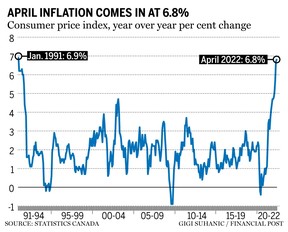Inflation highest since January 1991
Article content
Canada’s main inflation gauge increased 6.8 per cent in April from a year earlier, one of the fastest rates since the early 1980s. Here’s what you need to know.
Advertisement 2
Article content
How bad is it?
Not as bad as the United Kingdom, where inflation surged to nine per cent in April, according to figures published ahead of the new Canadian numbers.
But headline inflation of 6.8 per cent is still pretty bad. Year-over-year increases in the consumer price index spiked to 6.9 per cent in January 1991, and hovered around six per cent for much of that year. Otherwise, inflation hasn’t been this hot since the early 1980s.
There’s some evidence the pace of increases is slowing. The headline number was 6.7 per cent in March, which represented a startling increase from 5.7 per cent in February and 5.1 per cent in January. But math could begin to make headline inflation look better. That’s because inflation tends to be discussed as year-over-year changes in the consumer price index, which aggregates hundreds of prices of goods and services each month. For much of the past year, those calculations were being made against an unusually low base, as the index had plunged during the recession. Those “base effects” are no longer in play.
Advertisement 3
Article content

Still, some economists observed that gasoline prices, which always have an outsized influence on the headline number, jumped in May. And because transportation costs affect the price of almost everything, there’s a risk inflation becomes “entrenched” in the economy, Douglas Porter, chief economist at Bank of Montreal, said in a note to clients. “Barring a deep dive in oil prices in coming weeks and months, we expect that the worst is yet to come on the headline readings, and that inflation north of 6 per cent will still be with us by the end of this year,” he said.
What’s causing it?
The same things that caused inflation to break out of the top of the Bank of Canada’s comfort zone of one per cent to three per cent back in April 2021: commodity prices and housing-related costs.
Advertisement 4
Article content
Gasoline prices were 36 per cent higher than in April 2021, Statistics Canada said. The agency’s measure of what it would cost homeowners to replace their existing homes if they were to buy at current prices increased about 17 per cent, and general home expenses increased 13 per cent. Automobile prices and the cost of food, including restaurant meals, are the other big drivers.
Food purchased at stores surged 9.1 per cent, the biggest increase since 1981, the latest example of how the war in Ukraine, combined with already reduced supplies of staples after a string of poor harvests around the world, represents a serious threat to food security. Canada, overall, is rich enough to absorb the shock. Poorer countries aren’t.
Advertisement 5
Article content
Those are simply the most notable increases, but the pricing pressures are broad. More than 70 per cent of the goods and services that Statistics Canada tracks increased by more than two per cent from April 2021, according to Claire Fan, an economist at Royal Bank of Canada. Excluding gasoline, the index rose 5.8 per cent from a year earlier, the most since Statistics Canada created that sub-index in 1999.
There’s little doubt that the initial issue was supply. Lockdowns and absenteeism related to the pandemic crippled production in Asia, disrupting supply chains. Droughts and other extreme weather affected harvests, reducing stores of staples. At the same time, demand held up despite an epic recession, as governments and central banks responded to the pandemic with unprecedented levels of stimulus and much of the working population was able to work from home. Central bankers in Canada, the United States and elsewhere now concede they probably left interest rates too low for too long, as jobless rates are extremely low and demand has outstripped supply.
Advertisement 6
Article content
Is everything more expensive?
Not everything. Mortgage fees and telephone services are lower, and the cost of travel tours plunged 18.6 per cent from April 2021.
It’s worth pausing on mortgages. The cost of borrowing money to buy a home was 4.4 per cent lower than a year earlier. That’s important because it suggests homeowners who borrowed at lower rates won’t be in for a terrible shock when/if their mortgage rates reset over the months ahead.
-

Bank of Canada says 1% policy rate ‘too stimulative’, may need to go above neutral
-

‘We’re not getting it perfect’: Carolyn Rogers says the Bank of Canada is learning from its mistakes
-

Bank of Canada turns to interest rate guidance as it battles inflation
Does the Bank of Canada have an answer?
Advertisement 7
Article content
Yes: Higher interest rates.
The Bank of Canada has acknowledged that it misjudged the upward pressure on prices. The central bank’s latest quarterly economic outlook had year-over-year increases in the consumer price index averaging 5.6 per cent during the first quarter, and instead it averaged 5.8 per cent, the institution’s current forecast for the second quarter. Inflation is hotter than policymakers anticipated, which means they have little choice but to take a steeper path back to a higher interest-rate setting. Their primary mission is to keep the consumer price index increasing at annual rates of about two per cent. They have work to do.
Bank of Canada governor Tiff Macklem has all but said he will raise the benchmark interest rate a half-point when policymakers next adjust policy on June 1. That would push the rate lenders use as a guide for mortgage rates and other credit to 1.5 per cent, compared with 0.25 per cent at the start of the year.
The central bank’s leaders have indicated they won’t stop until they get the target rate to a “neutral” setting, which they define as something between two per cent and three per cent. Macklem has also said he might have to nudge the benchmark rate above three per cent to get inflation back to target.
• Email: kcarmichael@postmedia.com | Twitter: carmichaelkevin
Advertisement
Canada inflation rises again beating expectations
2022-05-18 17:19:34






